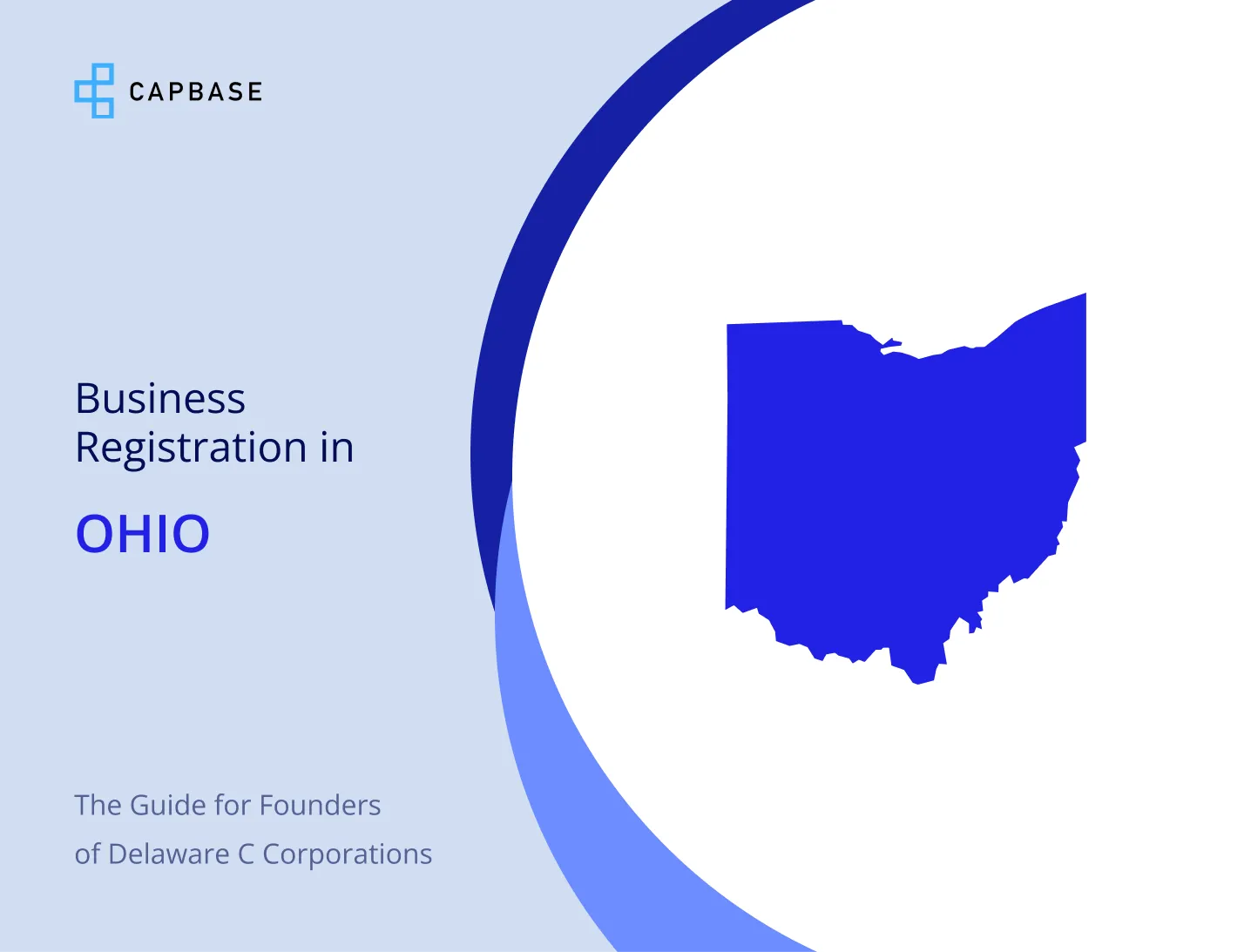
Registering Your Startup to do Business in Ohio
 by Capbase Staff • 7 min readpublished March 3, 2022 • updated December 4, 2023
by Capbase Staff • 7 min readpublished March 3, 2022 • updated December 4, 2023
Related

Stay ahead of the curve
You’ll get actionable advice, comprehensive guides, interviews with founders, and more.
Forming your business entity in Delaware—specifically, a corporation—gives you a lot of flexibility, but you may still need to follow local laws depending on what state you operate in.
Specifically, if you do business in Ohio, you need to register with the State. In this article we’ll do our best to explain the process and equip you with some of the information you'll need to have at the ready. But first, how can you tell whether you’re legally doing business in Ohio?
When to register as doing business in Ohio
Delaware C corps—and all other corporations formed outside of Ohio—are referred to as foreign entities by the State.
Like with most states, Ohio does not have a clear definition of what “doing business” in the state actually means. The State does specify that “conduct[ing] its usual business in a continuous, not merely sporadic, nature” but beyond this fairly vague guidance there aren’t many other concrete rules to point to. Other conditions which may indicate a company is “doing business” in Ohio including hiring full-time (W-2) employees who are Ohio residents, owning or leasing commercial property in Ohio, or having one or more members of the board of directors reside in Ohio.
However where Ohio law lacks in a positive definition of “doing business” in the state, section 1776.88 of the Revised Code lays out activities which are exempt from the “doing business” classification:
- Maintaining, defending, or settling an action or proceeding;
- Holding meetings of its partners or carrying on any other activity concerning its internal affairs;
- Maintaining bank accounts;
- Maintaining offices or agencies for the transfer, exchange, and registration of the partnership's own securities or maintaining trustees or depositories with respect to those securities;
- Selling through independent contractors;
- Soliciting or obtaining orders, whether by mail or through employees or agents or otherwise, if the orders require acceptance outside this state before they become contracts;
- Creating or acquiring indebtedness, with or without a mortgage or other security interest in property;
- Collecting debts or foreclosing mortgages or other security interests in property securing the debts, and holding, protecting, and maintaining property so acquired;
- Conducting an isolated transaction that is completed within thirty days and is not one in the course of similar transactions;
- Transacting business in interstate commerce.
When to register to collect sales tax in Ohio
Every state has different rules about when a corporation is required to pay sales tax. These are referred to as sales tax nexus regulations.
You can think of the nexus as a special version of that state’s border; if you perform certain business activities within that border, you fall into the state’s sales tax nexus, and you’re required to register for and collect state sales tax.
Typically, these actions take the form of buying and selling goods and services, but it can also include holding inventory within the State (including in third-party warehouses, such as Fulfillment by Amazon).
Businesses are required to register with the Ohio Department of Taxation and to charge, collect, and remit the appropriate tax when they have a physical presence in Ohio, such as a retail store, warehouse, inventory, or the regular presence of traveling salespeople or representatives trigger a sales tax collection obligation in the state.
Until the 2018 Supreme Court decision on South Dakota vs. Wayfair, Inc., selling or buying non-physical goods—like subscriptions to streaming services, SaaS memberships, etc.—did not, generally speaking, qualify you for sales tax nexus. After an important court ruling in 2018, that changed. Now, if you buy or sell non-physical goods or services in a state, you may fall within its sales tax nexus.
Ohio Sales Tax Nexus (physical goods and property)
Ohio stipulates that any person or business that has a physical presence in Ohio and makes taxable retail sales must be registered with the Department of Taxation. A physical presence in Ohio may look something like:
- Having a retail store, warehouse, or inventory in the state
- Regular presence of traveling salespeople or representatives
- Attending conventions or trade shows within Ohio
You can learn more about physical presence for sales tax purposes through the State’s website.
Ohio Sales Tax Nexus (non-physical goods and property)
The new state sales tax laws applying to non-physical (ie. internet) sales allow you to qualify for sales tax nexus even without physical presence or goods. In Ohio, you need to cross a certain threshold to qualify.
You will need to obtain an Ohio seller’s use tax license and pay applicable tax if your company:
- Has gross receipts into Ohio exceeding $100,000; or
- Has 200 or more separate transactions into Ohio
If you would like to take a deep dive, you can check out the State’s website.
As usual, this isn’t legal advice—just a guide. If you’re not 100% clear on whether you fall within Ohio’s sales tax nexus, it’s best to confer with your legal counsel and/or an accountant that has expertise in Ohio’s legal code and tax regulations.
How to register your non-Ohio business with the State of Ohio
- Select a name under which to do business. This doesn’t have to be the business name you registered when incorporating in Delaware, but it can be.
- Fill out an application. You’ll need to file Foreign For-Profit Corporation Application for License with the Ohio Secretary of State along with a certified copy of your Delaware Certificate of Good Standing. You can submit your application via an online filing through the state’s online portal.
- Pay a one-time $99 filing fee.
- Submit your Application for Registration.
- Wait. Processing typically takes two to four weeks.
Once your foreign qualification is approved in Ohio, you’ll need to comply with certain ongoing requirements.
Compliance as a Qualified Foreign Business in Ohio
To stay in compliance and continue legally doing business in Ohio, you need to maintain a statutory agent and pay your annual commercial activity tax (CAT). The commercial activity tax, is an annual tax imposed on the privilege of doing business in Ohio, measured by gross receipts from business activities in Ohio. Businesses with Ohio taxable gross receipts of $150,000 or more per calendar year must register for the CAT, file all the applicable returns, and make all corresponding payments.
Unlike most other states, Ohio does not have an annual reporting requirement for corporations. Other types of entities do have reporting requirements, but the intervals at which these reports must be compiled and submitted differ by the type of entity. Professional Associations and Limited Liability Partnerships are required to file biennial reports. Similarly, Nonprofit Corporations are required to file Certificates of Continued Existence, and trade names, fictitious names, and trademarks or service marks require renewals. For the timing of each of these filings, please consult the section of the legal code applicable to your entity or type of registration.
Be sure to keep current with your tax filings. For foreign corporations in Ohio, annual minimum tax and other annual tax returns are due on May 10th of each year since 2010.
Registered Agent in Ohio
Your registered agent (also known as a “designated statutory agent”) in Ohio is your point of contact with local authorities. If you don’t have a physical address for your company in Ohio, it may be advantageous to find a registered agent to receive state notices and service of process on your company’s behalf.
Foreign corporations are required to have a registered agent in Ohio. The office cannot be a P.O. box; it must be a physical address of your Ohio registered agent or a licensed Ohio registered agent service where your business (or a designated registered agent) is physically present.
Your registered agent will forward any important information, such as business mail, to you. There are a number of firms that contract out registered agents. They typically cost $50 – $100 per year.
Paying Commercial Activity Tax
Ohio’s commercial activity tax is a tax for the privilege of doing business in the state and is measured by gross receipts from business activities in Ohio. If you have 150,000 or more taxable gross receipts in Ohio per calendar year, you will need to register with Ohio’s Department of Taxation and make relevant business filings and payments.
For more information on filing and paying your annual taxes, please see the following guidance from Ohio’s Department of Taxation.
Sales Tax Registration In Ohio
If you fall within Ohio’s sales tax nexus, then you will need to get a seller’s use tax license.
There are two ways you can register for a seller’s use tax license depending on which fits your needs the best:
- The Ohio Business Gateway allows you to get a seller’s use tax license immediately. Please note that you must first create an account on Gateway before registering for a seller’s use tax license.
- The Streamlined Sales Tax Registration System lets you register for sales tax for multiple states. Ohio is part of this system so you can obtain an Ohio seller’s use tax license through the system.
Hiring And Paying Employees In Ohio
When you hire a new employee or independent contractor in Ohio you must report them to the Ohio New Hire Reporting Center within 20 days of the date of hire. You can report new hires through the employer services portal.
Your payroll provider should be able to take care of paycheck withholdings, but it’s up to you to register as an employer with the State and set up an online employer account.
(For a comprehensive guide of your responsibilities, Ohio provides the following information.)
The Easiest Way To Register Your Business In Ohio
To register your business in Ohio, you’ve got to keep track of a lot of moving parts. Failing to file the right forms, provide the right information, or stay on top of compliance laws can lead to serious headaches.
Capbase makes it easy. When you incorporate your Delaware corporation on Capbase, we will generate the required information needed to register to do business in Ohio and keep you up to date on any required filings.
The compliance calendar inside your Capbase account will notify you of upcoming fees, reporting, or other requirements, so you can keep your startup in good standing with Ohio state officials.

Written by Capbase Staff
Capbase is a team of designers, engineers, and business professionals spread across 6 time zones on 3 continents united by our passion for dogs, coffee, and great software.
Related
American Samoa Business Entity Registration for Delaware Corporations
Is your company doing business in American Samoa? Get an easy-to-follow explanation about what forms you’ll need, information about registration fees, filing deadlines, naming requirements, and more.
 by Capbase Staff • 7 min read
by Capbase Staff • 7 min readRegistering Your Startup To Do Business In West Virginia
Is your company doing business in West Virginia? Get an easy-to-follow explanation about what forms you’ll need, information about registration fees, filing deadlines, naming requirements, and more.
 by Capbase Staff • 7 min read
by Capbase Staff • 7 min readRegistering Your Startup To Do Business In Maine
Is your company doing business in Maine? Get an easy-to-follow explanation about what forms you’ll need, information about registration fees, filing deadlines, naming requirements, and more.
 by Capbase Staff • 7 min read
by Capbase Staff • 7 min read